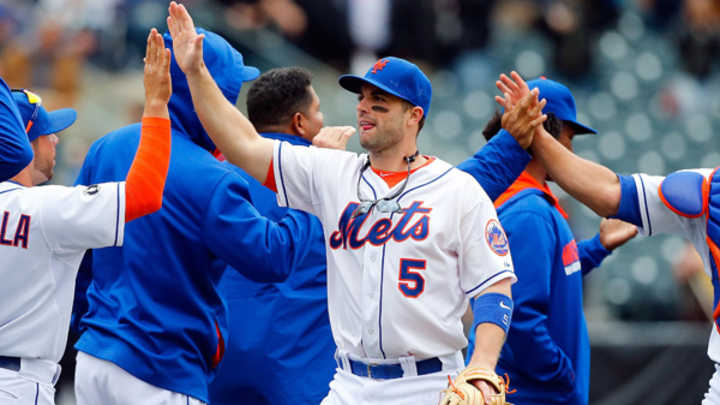Is early success for Mets and Rockies sustainable? Odds are against it

David Wright and the Mets are off to a surprising 15-11 start in 2014. (Jim McIsaac/Getty Images)

Quick, which team has the fourth-best record in the National League, leading the Dodgers, Cardinals and Nationals in the wild-card standings? Wouldja believe it's the New York Mets? At 15-11, the second-place Mets head to Denver on Thursday night to face a 16-13 Rockies team that has been similarly surprising in the early going and is just a half-game behind New York in those wild-card standings. Both teams were expected to lurk in the bottom third of the league heading into the season; both are in the top third instead after one month of play. What's going on here?
Let's start with the Rockies. Not only is Colorado just a game and a half behind the Giants in the NL West, but the Rockies also have the best run differential in the National League, and the third-best in all of baseball. That makes it seem like the Rockies are excelling on both sides of the ball, despite multiple injuries in their rotation. But that hasn't been the case. Instead, the Rockies are winning for one reason, and it's a familiar one: They are hitting the snot out of the ball in Coors Field.
You might want to sit down before you read these numbers: In their 12 home games this season, the Rockies are hitting .346/.398/.586 and scoring 7.4 runs per game. They have scored eight or more runs in eight of those dozen games. That has yielded an 8-4 record at home compared to their 8-9 record on the road, where they are hitting .254/.302/.403 and scoring just four runs per game. Their pitching has been unexceptional regardless of location, allowing 4.6 runs per game overall, which after adjusting for park factors, comes out pretty close to league average.
The Rockies have also faced just two of the other seven National League teams that have winning records heading into Thursday's action. They impressed by taking two of three from the Dodgers last weekend, but they merely split their six games against the Giants thus far, taking (no surprise) two of three at home and dropping two of three on the road.
Colorado will get its best starter, Jhoulys Chacin, back from the disabled list on Sunday, the finale of their four-game set against New York. Carlos Gonzalez hasn't hit his stride yet, and Justin Morneau's rejuvenation has thus far not been a Coors Field fluke (he's hitting .328/.333/.586 on the road). So there are some reasons for the Rockies to hope that they can minimize the coming regression. Still, it's difficult to see Colorado as anything other than a small-sample fluke, particularly given the fact that they were even better last April, going 16-11 before playing .430 ball over the season's final five months.
There are similar things going on with the Mets, albeit with the locations flipped. The Mets have played the bulk of their games at home this year, 16 to be exact, where they have been a .500 team that scores just 3.3 runs per game and has a -9 run differential. In their ten road games, however, they are 7-3 and have scored 5.3 runs per game (in contrast, their pitching has been consistent, allowing roughly 3.8 runs both home and away, also roughly league average after correcting for park factors).
In contrast to the Rockies, however, the Mets' run-scoring spike in that smaller sample of games has not been sustained by hot hitting. The Mets have hit just .259/.333/.343 on the road, roughly equivalent to the Rockies' road split but trading some slugging for some higher-value out-avoidance. As a result, when you look at their third-order records—which create expected runs scored and allowed from the components of offense (hits, walks, stolen bases, etc.) then use that run differential to create an expected record—the Rockies come out at the same 16-13 they've compiled on the field, but the Mets have played like an 11-15 team, the inverse of their actual record.
Given the illusory nature of the Mets' success thus far, there's even less reason to be optimistic about the remainder of their season. David Wright is sure to heat up, but outside of that, there's not a lot to dream on when looking at the Mets' lineup, and the lineup is where the improvement would have to come. Simple probability says that Curtis Granderson will perk up, but confidence is low. The same goes for rookie catcher Travis d'Arnaud, and no one else is significantly underperforming their recent levels of production (for that matter, neither is d'Arnaud, who was worse in a larger sample in his major league debut last year).
As Jay Jaffe pointed out a year ago when looking at the Royals' hot start, research by Baseball Prospectus' Rany Jazayerli and Derek Carty indicates that teams' current-year records aren't more predictive than pre-season expectations based on weighted three-year records (35 percent for the previous year, 12 for two years prior, five percent for three years prior and 48 percent for .500 representing overall regression to the mean) until teams have played 48 games in the current season. The Rockies and Mets are at 29 and 26 games, respectively, and their weighted three-year winning percentages are .470 and .479.
